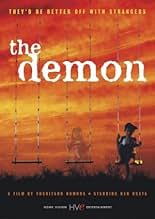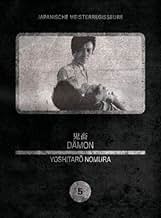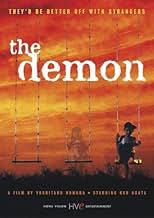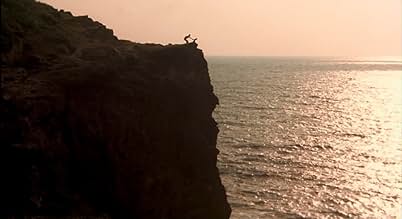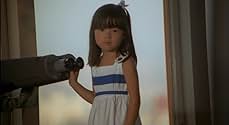Kichiku
- 1978
- 1 h 50 min
AVALIAÇÃO DA IMDb
7,4/10
1,1 mil
SUA AVALIAÇÃO
Depois que um homem casado deixa de sustentar sua amante, ela abandona seus três filhos pequenos com ele e sua esposa irada.Depois que um homem casado deixa de sustentar sua amante, ela abandona seus três filhos pequenos com ele e sua esposa irada.Depois que um homem casado deixa de sustentar sua amante, ela abandona seus três filhos pequenos com ele e sua esposa irada.
- Prêmios
- 9 vitórias e 3 indicações no total
- Direção
- Roteiristas
- Elenco e equipe completos
- Produção, bilheteria e muito mais no IMDbPro
Avaliação em destaque
Wicked stepmother stories, whether fairy tales or memoirs, usually come at us from the point of view of the child. Here the point of view floats. It almost never rests with a child, as three adults shunt not just children, hot potato-like, but also responsibility, blame, and guilt. Only Ken Ogata's Sochiki, possibly the "demon" of the title, the children's father, hesitates at the film's brutalities. Only he has the customary exculpatory back story (his own father and uncle
).
Is the father the title's "demon"? Before I read the DVD liner notes which I think imply the father, I assumed it was Sochiki's wounded but manipulating wife, Oume. She's unrelenting. Every time the camera lingers, as if anticipating some hint of even involuntary or innate womanly compassion, she disappoints. The kids fear her, but continually forgive their father. Few heartfelt villains are as lankily goofy as Ogata plays Sochiki. In more recent film language, meaning the J-horror trend, though I'm sure it wasn't Nomura's intent at all, the miraculously death-defying five-year-old Riichi, the oldest child, would have to be the demon. At times, Riichi, preternaturally wise at five, seems demon-like, obstacle-like, as chance, luck, and his own cunning or, more credibly, intuition, thwart every attempt to extinguish him. Camera angles looking at him through Sochiki's or Oume's eyes anachronistically mimic shots of demon children in the Ringu films, Ju-on, Tomie, etc., etc. I don't know what that means, or why it came to me here, but there it is. Maybe the "demon" is something human or societal floating between all Nomura's players.
Obvious touch points, each like this film based on a true incident, are Oshima's "Boy" (Shonen) and, though I've yet to see it, Kore-eda's "Nobody Knows" (Dare mo shiranai).
Is the father the title's "demon"? Before I read the DVD liner notes which I think imply the father, I assumed it was Sochiki's wounded but manipulating wife, Oume. She's unrelenting. Every time the camera lingers, as if anticipating some hint of even involuntary or innate womanly compassion, she disappoints. The kids fear her, but continually forgive their father. Few heartfelt villains are as lankily goofy as Ogata plays Sochiki. In more recent film language, meaning the J-horror trend, though I'm sure it wasn't Nomura's intent at all, the miraculously death-defying five-year-old Riichi, the oldest child, would have to be the demon. At times, Riichi, preternaturally wise at five, seems demon-like, obstacle-like, as chance, luck, and his own cunning or, more credibly, intuition, thwart every attempt to extinguish him. Camera angles looking at him through Sochiki's or Oume's eyes anachronistically mimic shots of demon children in the Ringu films, Ju-on, Tomie, etc., etc. I don't know what that means, or why it came to me here, but there it is. Maybe the "demon" is something human or societal floating between all Nomura's players.
Obvious touch points, each like this film based on a true incident, are Oshima's "Boy" (Shonen) and, though I've yet to see it, Kore-eda's "Nobody Knows" (Dare mo shiranai).
- frankgaipa
- 6 de mar. de 2005
- Link permanente
Enredo
Você sabia?
Principais escolhas
Faça login para avaliar e ver a lista de recomendações personalizadas
Detalhes
Contribua para esta página
Sugerir uma alteração ou adicionar conteúdo ausente







